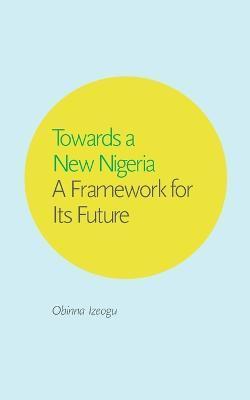Towards a New Nigeria

Towards a New Nigeria
Towards a New Nigeria begins by framing the systemic challenges in Nigeria. In the book, Obinna Izeogu lays out the nine essential problems Nigeria faces. They are poverty, the economy, gender equality, a poor standard of education, unemployment, health and human services, crime and terrorism, corruption, and the environment. Izeogu argues in the book that these problems are interrelated and must be seen as such. He emphasizes the role other nations can play: the examples of which types of policies could benefit Nigeria. He discusses the importance of creating a circular economy. The various systems that can help move away from the take, make, and waste linear mode of production. Instead, value can be seen as a service within circular models.
Thinking in terms of relationships, we find the role of nature where there is no waste. Izeogu argues that benchmarks and indices can act as set points critical to development that can be fined tuned through measurement.
The seventeen Sustainable Development Goals are called out as an example to guide Nigeria in its effort to end poverty along with improving health and education. He goes on to discuss the European Manifesto which takes on the approach of aligning policy-making with strategies that are regenerative in circular frameworks moving toward a new economy of resource efficiency.
Izeogu takes a direct approach and identifies who the key stakeholders are: local, state, and federal government along with Africa as a whole, humanity, and ultimately nature. He uses the world's fair in Hannover, Germany (Expo 2000) to illustrate principles for sustainability continuing the theme of learning from the international community.
In a crucially important section of the book, Izeogu argues that Nigeria as a country is a system: the Nigeria system which needs to work holistically with all its interdependent parts: the economy, the environment, and the society. These parts work in a relationship with each other. For example, the economy affects the education system which goes on to affect and be affected by society.
Life-cycle analysis is a key point. Izeogu gives the example of oil and gas extraction and how it affects Nigeria as a system. The larger context of the oil and gas sector needs to be considered in terms of the impact it has on the economy: what happens when renewable energy becomes the dominant way countries receive energy? In an economy tethered to the fluctuations of the oil and gas sector
PRP: 160.17 Lei
Acesta este Prețul Recomandat de Producător. Prețul de vânzare al produsului este afișat mai jos.
144.15Lei
144.15Lei
160.17 LeiLivrare in 2-4 saptamani
Descrierea produsului
Towards a New Nigeria begins by framing the systemic challenges in Nigeria. In the book, Obinna Izeogu lays out the nine essential problems Nigeria faces. They are poverty, the economy, gender equality, a poor standard of education, unemployment, health and human services, crime and terrorism, corruption, and the environment. Izeogu argues in the book that these problems are interrelated and must be seen as such. He emphasizes the role other nations can play: the examples of which types of policies could benefit Nigeria. He discusses the importance of creating a circular economy. The various systems that can help move away from the take, make, and waste linear mode of production. Instead, value can be seen as a service within circular models.
Thinking in terms of relationships, we find the role of nature where there is no waste. Izeogu argues that benchmarks and indices can act as set points critical to development that can be fined tuned through measurement.
The seventeen Sustainable Development Goals are called out as an example to guide Nigeria in its effort to end poverty along with improving health and education. He goes on to discuss the European Manifesto which takes on the approach of aligning policy-making with strategies that are regenerative in circular frameworks moving toward a new economy of resource efficiency.
Izeogu takes a direct approach and identifies who the key stakeholders are: local, state, and federal government along with Africa as a whole, humanity, and ultimately nature. He uses the world's fair in Hannover, Germany (Expo 2000) to illustrate principles for sustainability continuing the theme of learning from the international community.
In a crucially important section of the book, Izeogu argues that Nigeria as a country is a system: the Nigeria system which needs to work holistically with all its interdependent parts: the economy, the environment, and the society. These parts work in a relationship with each other. For example, the economy affects the education system which goes on to affect and be affected by society.
Life-cycle analysis is a key point. Izeogu gives the example of oil and gas extraction and how it affects Nigeria as a system. The larger context of the oil and gas sector needs to be considered in terms of the impact it has on the economy: what happens when renewable energy becomes the dominant way countries receive energy? In an economy tethered to the fluctuations of the oil and gas sector
Detaliile produsului










